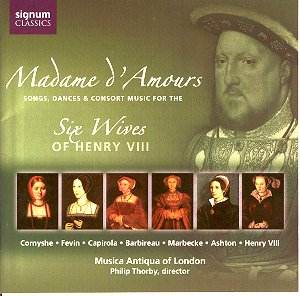This disc in Signum’s
Classics label is of repertoire which
has often been mulled over in recent
years although in a variety of guises.
Some of these songs and dances have
been recorded many times over the last
forty years dating back to the start
of the early music revival. The new
slant here is to relate these pieces
to Henry’s six specific Queens, that
is to their characters, place of birth
and religious stance and an attempt
has been made to date each piece. Indeed
the musicians sometimes associate with
the Queens. Overall the selection makes
for an attractive programme.
The range of composers
reflects a cosmopolitan selection. After
all, Henry married a Spanish queen and
a Dutch duchess. Accordingly, in addition
to English composers, we hear from popular
‘foreign’ composers whose music strayed
across the English Channel and North
Sea. These possibly found their way
into the songbooks of the time especially
the Henry VIII Songbook.
The excellent Philip
Thorby in his exemplary booklet notes
gives us a basic background to Henry
and his music. He takes each queen in
turn and presents five or six compositions
to represent her. One of Catherine of
Aragon’s pieces is the now famous ‘danza
alta’ by her countryman Francisco de
la Torre (c.1500). Thus the disc opens
with the medieval sound of crumhorns.
One song to represent Anne of Cleves
is by her countryman Barbireau. His
wonderful ‘Een vroulic wesen’ is probably
the only song Anne would have been able
to sing. How disappointing, by the way,
that both verses are printed in the
booklet but we are only given one to
hear. The Protestant Catherine Parr
is represented by a ‘Pavyn and Galliard’
which she herself is reputed to have
danced when accompanied by her own musicians
including Vincent and Albert of Venice.
The disc ends with an rarely heard extended
work by Hugh Aston for viol consort.
As Thorby says, this piece "clearly
points the way to the glories of the
Elizabethan and Jacobean fantasies".
The history and development of early
renaissance music is enshrined herewith.
The Henry VIII Songbook
contains ‘Een vroulic wesen’, also Henry’s
own ‘En Vray amor’ together with the
song which gives its name to this CD
the warmly beautiful four-part ‘Madame
D’amours’. This was singled out by John
Stevens in his ground-breaking study
‘Music and Poetry at the Tudor Court’
(Cambridge 1961) as one of the finest
songs of the era. The song seems to
sum up the entire repertoire. Perhaps
Jennie Cassidy has been listening to
Emily van Evera’s magical performance
of it on ‘The Flower of all Ships’ a
CRD record from 1985. Cassidy has, throughout
the disc but especially in this song,
a wonderful melancholic fragility mixed
with a certain coyness which is just
ideal.
Musical Antiqua of
London - which consists of seven incredibly
versatile musicians - has also recorded
a few songs which I have not come across
before. These include the beautiful,
typically folk-like, ballad by Cornyshe
‘Whiles Lyfe’. There is also the setting
of ‘Nigra sum’ by a composer otherwise
unknown to me Matthieu de Gascogne ‘I
am black but beautiful ... the king
has called me to his bed-chamber’. Both
of theses songs are associated with
Catherine of Aragon. Other songs in
the Henry VIII book include ‘Gentil
prince’, often attributed to Henry and
place here with Jane Seymour’s era.
The oft-recorded ‘Blow thi horne hunter’
by Cornysh is allocated to Anne Boleyn’s
section probably because of its ‘double-entendres’.
Music Antiqua is a
superb and virtuosic instrumental ensemble
who add a single voice to give variety
to their programme. I do so wish that
they would consider, next time, occasionally
adding a male voice for yet further
variety. I can’t help but feel that
the delicious but curiously anonymous
setting of Thomas Wyatt’s poem ‘Blame
not my Lute’ would be better sung by
a male voice; the same can be said of
the fairly raucous ‘Blow thi horne’.
All in all a CD which
puts a unique slant on English Henrican
court music. Performances demonstrating
an ideal blend of panache, beauty and
intelligence.
Gary Higginson
.












